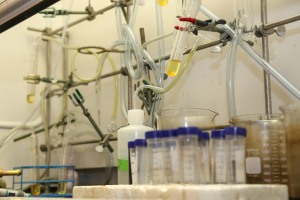The Brown University chemical engineering master's program prepares students to apply chemical and engineering principles to emerging technologies. The program emphasizes a molecular engineering approach to problem-solving. Students will learn how engineering at the atomic scale can be used to solve some of the most pressing technical challenges facing society. The program provides a rigorous foundation in engineering fundamentals and space for students to craft a program for their desired goals. Our students go on to work in industry, start-ups, consulting, graduate and professional schools, and many other fields.
The objectives of the Brown University Chemical Engineering Sc.M. Program are to produce graduates who will: (1) apply their knowledge of engineering, science, mathematics, and liberal arts to successful careers and leadership roles in industry, government, or academia; (2) apply independent, critical, and integrative thinking to a broad range of complex, multidisciplinary problems, and effectively communicate their solutions to broad audiences of diverse backgrounds; and (3) show a lifelong commitment to technical approaches that address the needs of society in an ethical, safe, sustainable, and environmentally responsible manner.
Students in the ChemE master’s program can study a broad range of topics including:
- Catalyst design
- Reaction engineering
- Nanoscience
- Electrochemistry
- Renewable energy technology
- Biotechnology
- Transport processes
- Carbon-based materials
Program of study
MASTER OF SCIENCE – NON-THESIS OPTION
Students take a total of eight courses to satisfy the degree requirements. Students are expected to complete the Master of Science – Non-Thesis program option in three semesters, taking three courses in the first and second semesters, and two courses in the third semester.
MASTER OF SCIENCE – THESIS OPTION
Students take a total of eight courses, including independent reading and research courses. Students are expected to complete the Master of Science – Thesis program option in four semesters, taking three courses in the first semester, two in the second and third semesters, and one in the fourth semester. Students can switch between degree options during the program for greater flexibility. Students interested in pursuing the Thesis option usually identify a faculty advisor during their first or second semester at Brown.
MASTER OF SCIENCE – PROFESSIONAL OPTION
Non-thesis and thesis* students can also complete the professional track. In addition to the above requirements, a paid or unpaid experiential learning experience of three to six months is a required component of the professional track. Experiential learning can include a summer internship or completion of ENGN 2960 (Experiential Learning in Industry (ELI)) as an elective course. Assistance in obtaining internships will be provided by the School of Engineering and Career Services and Professional Development in the School of Professional Studies.
*Thesis students need permission from their thesis advisor to pursue this track.
